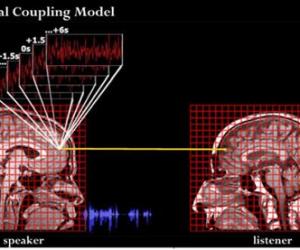www.psychspace.com心理学空间网
 Following the brain scans of the conversations, the researchers asked the listeners to fill out a questionnaire detailing their comprehension of the story. Remarkably, the scans show similar areas of the brains of speakers and listeners firing, with a slight lag for the listener, during more effective conversations. Further, some listener's brain cells fired up in some brain regions ahead of the speakers, indicating they were predicting where the story was headed, says the study:
Following the brain scans of the conversations, the researchers asked the listeners to fill out a questionnaire detailing their comprehension of the story. Remarkably, the scans show similar areas of the brains of speakers and listeners firing, with a slight lag for the listener, during more effective conversations. Further, some listener's brain cells fired up in some brain regions ahead of the speakers, indicating they were predicting where the story was headed, says the study:
Shades of Mr. Spock -- our brain cells really do "mind meld" during intense communication, suggest psychologists.
In the Proceedings of the National Academy of Sciences journal study, a team led by Princeton's Greg Stephens looks at functional magnetic resonance imaging brain scans of people involved in unrehearsed, real-life stories. "To make the study as ecologically valid as possible, we instructed the speaker to speak as if telling the story to a friend," says the study.
 Following the brain scans of the conversations, the researchers asked the listeners to fill out a questionnaire detailing their comprehension of the story. Remarkably, the scans show similar areas of the brains of speakers and listeners firing, with a slight lag for the listener, during more effective conversations. Further, some listener's brain cells fired up in some brain regions ahead of the speakers, indicating they were predicting where the story was headed, says the study:
Following the brain scans of the conversations, the researchers asked the listeners to fill out a questionnaire detailing their comprehension of the story. Remarkably, the scans show similar areas of the brains of speakers and listeners firing, with a slight lag for the listener, during more effective conversations. Further, some listener's brain cells fired up in some brain regions ahead of the speakers, indicating they were predicting where the story was headed, says the study:"The findings shown here indicate that during successful communication, speakers' and listeners' brains exhibit joint, temporally coupled, response patterns. Such neural coupling substantially diminishes in the absence of communication, such as when listening to an unintelligible foreign language. Moreover, more extensive speaker–listener neural couplings result in more successful communication. We further show that on average the listener's brain activity mirrors the speaker's brain activity with temporal (time) delays. Such delays are in agreement with the flow of information across communicators and imply a causal relationship by which the speaker's production-based processes induce and shape the neural responses in the listener's brain."
The findings add weight to animal studies showing "mirror" neurons, or brain cells, firing up when creatures observe one another, suggested by some as the starting point for empathy in the human brain. "Further understanding of the neural processes that facilitate neural coupling across interlocutors may shed light on the mechanisms by which our brains interact and bind to form societies," says the study.
Fascinating, as everyone's favorite Star Trek Vulcan might say.
By Dan Vergano
www.psychspace.com心理学空间网

